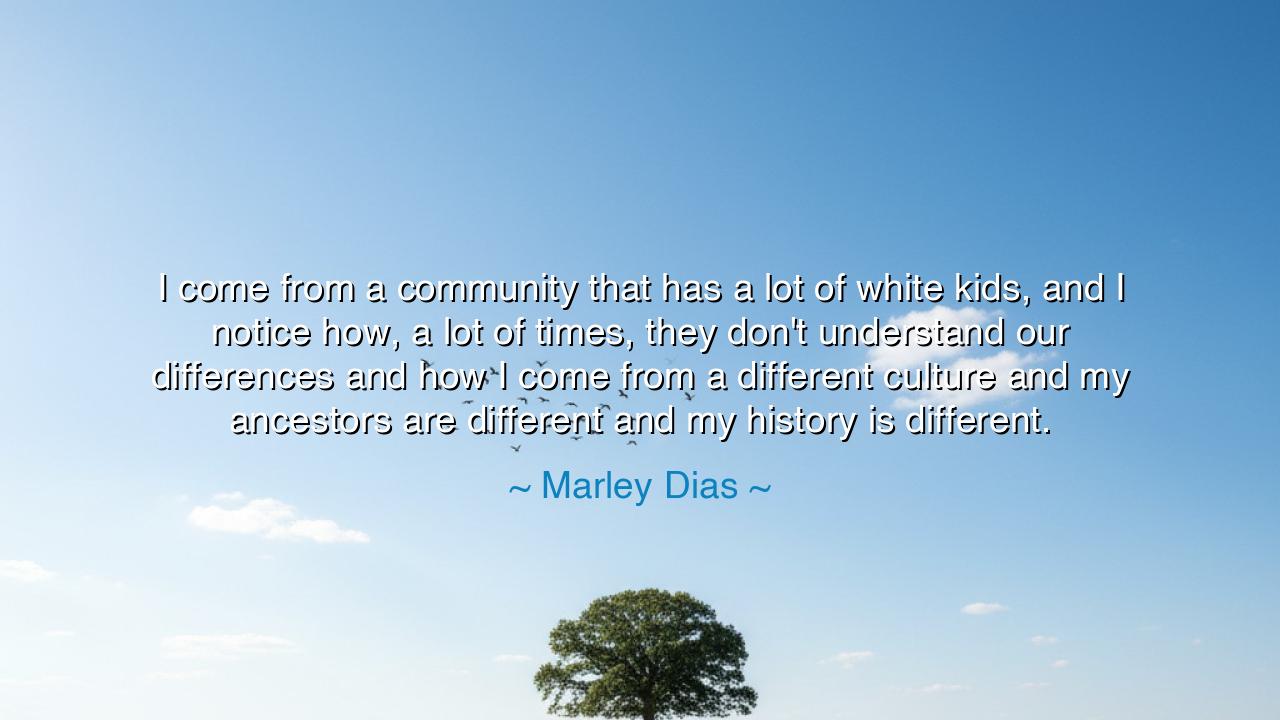
I come from a community that has a lot of white kids, and I
I come from a community that has a lot of white kids, and I notice how, a lot of times, they don't understand our differences and how I come from a different culture and my ancestors are different and my history is different.






In the voice of youthful wisdom and awakening, Marley Dias, a child of vision and courage, once spoke these words: “I come from a community that has a lot of white kids, and I notice how, a lot of times, they don't understand our differences and how I come from a different culture and my ancestors are different and my history is different.” These words, though spoken by one young in years, carry the depth of generations. They are not a cry of division but a call for recognition—for the acknowledgment that identity is sacred, and that to truly see one another, we must honor the roots from which each of us has grown. In Marley’s voice, the ancient yearning for understanding resounds again: the desire to be seen not as an image, but as a story, woven through time by those who came before.
To understand the origin of this quote, one must know the story of Marley Dias herself. Born in 2005, she rose to prominence at just eleven years old as the founder of the movement #1000BlackGirlBooks, a campaign to collect and share stories in which young Black girls could see themselves represented. Her mission was born from frustration—that the books she read in school rarely reflected her culture, her history, or her heroes. Surrounded by peers who could find their likeness in countless tales, Marley recognized that her own reflection was missing from the mirrors of literature. Her words about being among “white kids” were not spoken with resentment, but with clarity: she had seen how the world often teaches some to forget difference, rather than to celebrate it. And so, she sought to remind all that to know one another, we must first know ourselves.
The power of her words lies in their honesty. She speaks to a truth that the wise of every age have known—that the ignorance of difference breeds not peace, but distance. In her observation, there is the quiet ache of history itself: how centuries of domination and exclusion have made many blind to the diversity of human experience. To live among others who do not understand your culture, your ancestors, or your story is to live both seen and unseen—to walk in two worlds, carrying the weight of both. Yet in recognizing this tension, Marley does what the greatest teachers have always done: she transforms it into understanding. She invites others not to pity her difference, but to learn from it, to see in it another face of the same human truth.
The ancients understood that the strength of a civilization lies not in its sameness, but in its harmony of differences. The philosopher Plato wrote of the just city as one in which every soul fulfills its own nature in balance with others. The African principle of Ubuntu teaches, “I am because we are,” affirming that identity is born in relationship. Marley’s insight belongs to this timeless lineage. Her call is not for separation, but for awareness—for a world where every child grows up knowing that their heritage is not an obstacle to belonging, but the foundation of it. The story of humanity, she reminds us, is a tapestry of cultures, and when one thread is ignored, the whole fabric weakens.
Consider, too, the example of Zora Neale Hurston, the great Black writer and anthropologist of the Harlem Renaissance. Like Marley, Hurston found herself surrounded by misunderstanding. She wrote of her struggle to be accepted not only as a writer, but as a Black woman whose voice did not conform to the expectations of others. “I do not weep at the world,” she said. “I am too busy sharpening my oyster knife.” She embraced her identity fully and, in doing so, taught the world to listen. Marley Dias stands in the same lineage—a young Hurston of her generation—reminding the world that to ignore difference is to lose wisdom, and to celebrate it is to expand the soul of humanity.
There is a sacred power in Marley’s awareness of ancestors. When she says, “my ancestors are different and my history is different,” she is invoking the invisible river of heritage that flows through every person. The child who knows her ancestors walks with strength, for she carries their memory within her bones. The tragedy, then, is not that people are different—it is that some are taught to forget. Marley calls for remembrance, for the revival of historical consciousness in a world too eager to move forward without looking back. To know her history is to honor the endurance of her people—the ones who built, resisted, and dreamed—and to teach others that progress without remembrance is hollow.
So let this be the teaching drawn from her words: to understand another, you must first see their story as sacred. Do not erase difference in the name of comfort. Seek instead to learn from it, to let it widen your heart. Listen to the histories that are not your own, for in doing so, you become more fully human. Honor your own ancestors, as Marley does, by speaking their truth even when others do not understand. And when you find yourself among those who cannot yet see you clearly, do not shrink—stand firm in your story. For as Marley Dias reminds us, difference is not division; it is the essence of our shared humanity. To know who we are, and to honor where we come from, is the beginning of true understanding, and the first step toward a world worthy of all its people.






AAdministratorAdministrator
Welcome, honored guests. Please leave a comment, we will respond soon